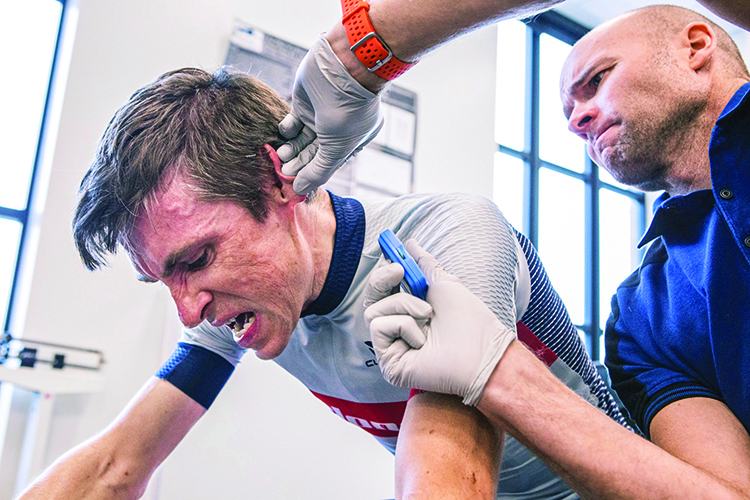Chris Case ’99 develops a smart coaching site to help athletes get fitter and faster.
In his early years as a competitive athlete, Chris Case ’99 had some notable accomplishments. He ran nationally in races starting at age 10, was the 1993 Connecticut state champion in the 2-mile track event, and went to the Junior Olympics. But he never had sophisticated coaching.
“I didn’t know the first thing about training,” Case says.
Now, the science/sports journalist and former top amateur bike racer has that knowledge and shares it with athletes worldwide. In early 2020, Case partnered with exercise physiologist Trevor Connor to launch Fast Talk Laboratories, a Boulder, Colo.-based company focused on science-based coaching for endurance athletes.
“Fast Talk Labs is a virtual performance center for people to tap into,” Case says. “Especially in the midst of a pandemic, people still want to train and be healthy, and they’ll race again. So we give them all the tools they need to be healthier and faster.” The paid subscription service offers articles, videos, and workshops with coaches, researchers, and exercise physiologists, along with live (virtual) training and webinars. Topics cover everything from race-day nutrition to training intensity zones.
Case leads training sessions, writes articles, and interviews guests. “I like to investigate how to get healthier and faster using science-based knowledge and education to get there. I want people to understand that they can become better athletes if they become thinking athletes and know the research behind it.”
Fast Talk Labs grew out of Fast Talk podcast, a weekly show cohosted by Connor and Case that explores the science behind endurance sports. “Whether it’s how to enhance recovery or determining your aerobic versus anaerobic threshold, we get really nerdy,” Case says. “Our audience has a pretty voracious appetite for the ‘why’ of certain things.”
At the time Fast Talk Labs launched, Case was wrapping up his career as managing editor of the bike racing magazine VeloNews. It’s where he met Connor, who wrote a training column and ended up coaching Case. “Once I witnessed [Connor’s] methods and then started working with him, I realized what sophisticated coaching was all about.”
In September 2015, Connor coached Case for the prestigious Hour Record, where cyclists individually ride as many laps as they can around a velodrome. “I became a lab rat, documented how I trained, then attempted the record,” says Case, who by the end could barely hold up his head. “It was the most gruesome thing I’ve ever done to myself.” (He rode 45.927 kilometers in one hour, which would have set a national record for the 35- to 39-year-old group. The record wasn’t official, however, because there were no cycling federation officials present.)
Case’s original career path was science, having majored in neuroscience and art at Colgate. After graduating, he earned a National Institute of Mental Health fellowship and studied schizophrenia for two years, then worked at University of Colorado Health Sciences Center researching Parkinson’s disease. The bulk of his time was spent prepping monkey brains for slides; disgusted and bored, he decided to refocus and apply to a journalism graduate program at the University of Texas at Austin. “I was obsessed with National Geographic and photojournalism as a kid,” he explains.
He started bike racing during graduate school and quickly moved up the ranks. After graduating in 2006, Case did freelance photography, became creative director at a mountaineering museum, and then edited and designed an outdoor recreation and conservation magazine in Colorado. There, he devoted even more time to cycling, eventually winning silver at the 2013 UCI Masters Cyclo-cross World Championships. Case stopped racing two years ago, and now he and his wife enjoy cycling adventures with their 5-year-old daughter. He commutes via bike to his Fast Talk Labs offices. “[When I ride,] I let my mind go where it wants to go,” he says. “A successful bike ride allows for contemplation and relaxation — it’s good medicine.”

